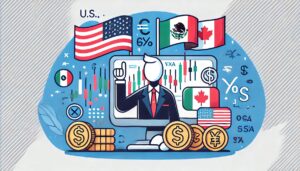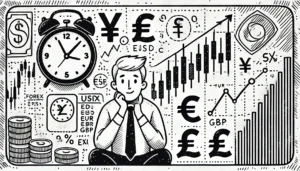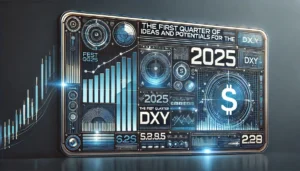Forex trading is a complex and dynamic market that requires careful planning, analysis, and execution. For traders looking to enhance their skills and profits, Auvoria Prime offers a comprehensive suite of tools and resources, including a feature-rich platform for Forex Social Trading.
The Emergence of Social Trading
Forex Social Trading is getting more popular among traders. It gives a different way to trade by letting people use the knowledge and skills of others in the market.
How Does Social Trading Work?
At its core, Forex Social Trading involves following and copying the trades of experienced and successful traders. This allows less experienced traders to benefit from the strategies and insights of seasoned traders without having to go through the extensive process of learning and testing strategies on their own.
The Benefits of Social Trading
The benefits of Social Trading are numerous, including:
- Access to Expert Advice: Forex Social Trading connects you to the knowledge and skills of expert traders.
- Lower Risks: By using proven strategies, traders can lower risks and improve their chances of winning.
- Time Savings: Forex Social Trading saves time because you don’t have to do a lot of research and analysis.
- Community Help: Traders can talk to and learn from other traders who think as they do.
Auvoria Prime’s Social Trading Platform
Auvoria Prime’s Social Trading platform is designed to cater to the needs of both novice and experienced traders. It offers a user-friendly interface, a wide range of trading instruments, and a community of traders to connect with.

get the access pass
Increase profits using a mix of expert advisors, indicators, and live trading room tools with the Auvoria Prime Access Pass.
* Includes Social Trading monthly fee
Live Trading Rooms and Indicators
Auvoria Prime’s Access Pass offers more than expert advisors. It gives access to live trading rooms and various Expert Advisors. These tools help traders keep up with market trends and make choices based on current data.
Building a Trading Community
Social Trading has a strong community feel. Traders can connect, share ideas, and learn from each other. Auvoria Prime’s Forex Social Trading platform gives traders a space to form and connect with a trading community.
The Power of Copy Trading
Copy Trading is a part of Social Trading. It lets traders copy the trades of successful traders automatically. This is helpful for traders who don’t have the time or skills to analyze the market and make smart choices.
How Copy Trading Works
Copy Trading lets you choose successful traders to follow. When you choose a trader, your account copies their trades. If they make a trade, your account does too, based on your investment amount.
Advantages of Copy Trading
Copy Trading offers several advantages, including:
- Easy to Use: Copy Trading is simple and easy to understand, so anyone can use it, no matter their level of experience.
- Spread Investments: By following more than one trader, you can diversify your investments and spread out your risk.
- Passive Income: Copy Trading allows traders to earn passive income by following successful traders and benefiting from their expertise.
Risks of Copy Trading
While Copy Trading offers several advantages, it’s important to be aware of the risks involved. These risks include:
- Market Risk: The forex market is very unpredictable, and prices can change quickly, which could lead to losses.
- Strategy Risk: The success of Copy Trading depends on the strategies of the traders being followed. If their plans fail, the follower’s account could also lose money.
- Platform Risk: The reliability of the trading platform is essential for successful Copy Trading. If the platform has technical problems, it could affect how trades are carried out.
Auvoria Prime’s Approach to Copy Trading
Auvoria Prime has a complete approach to Copy Trading. They offer many tools and resources to help you make smart choices. The platform shows detailed information about each trader. This includes their trading history, how well they’ve done, and how risky they are. This helps followers decide who to follow and how much money to put in.
Strategies for Successful Copy Trading
To succeed in Copy Trading, it’s important to have a solid strategy in place. This includes:
- Diversification: Follow multiple traders to spread risk and increase the chances of success.
- Risk Management: Set clear risk parameters and stick to them. This may include setting stop-loss levels and limiting the amount invested in each trade.
- Keep an Eye on Performance: Check how well the traders you follow are doing regularly and change your strategy if needed.
The Role of Indicators in Social Trading
Expert Advisors are very important in Forex Social Trading. They give you important information about market trends and help you make smart choices. Auvoria Prime has many Expert Advisors, like moving averages, RSI, and MACD. You can use these with Forex Social Trading to do even better.
The Importance of a Trading Plan
A trading plan is key for doing well in Forex Social Trading. It sets out your goals, how much risk you’ll take, and your methods. Following a plan keeps you focused and stops you from making quick, emotional choices.
Understanding Social Trading and Its Suitability for Various Traders
Social Trading is a different way to do forex trading. It lets traders work together and use the skills of more experienced ones. But, it’s key to know who can use Social Trading. It’s not for traders in the United States because of rules.
Exploring the Suitability of Social Trading
Novice Traders and Social Trading
For novice traders, Social Trading presents a valuable opportunity to learn and grow. This approach allows beginners to:
- Learn from Experts: Novice traders can see what seasoned traders do and get insights into the forex market.
- Lower Risks: Social Trading can help new traders lower risks by following successful traders.
- Build Trust: Being part of Social Trading helps new traders gain confidence in forex trading.
Busy Professionals and Social Trading
Busy professionals can benefit a lot from Forex Social Trading. This method enables them to:
- Save Time: Social Trading automates trading, so busy pros can invest without hours of market research.
- Spread Investments: Following many traders lets pros spread their money and reduce risk.
- Make Money Passively: Social Trading lets busy pros make money by following successful traders’ methods.
Part-Time Traders and Social Trading
Part-time traders with other commitments can find Forex Social Trading flexible. It gives them:
- Flexibility: Social Trading lets part-time traders trade forex without being on their screens all the time.
- Community Help: Social Trading gives part-timers support and a place to share ideas with others.
- Better Risk Management: Following tried-and-true strategies helps part-time traders manage risks better.
Experienced Traders and Social Trading
Even experienced traders can find value in Social Trading. This method provides them with:
- Diverse Strategies: Experienced traders can mix up their trading by using other successful traders’ methods.
- Networking Chances: Social Trading platforms make it easy for experienced traders to network and share ideas.
- Enhanced Profit Potential: Experienced traders can potentially boost their profits by following other successful traders
Who Cannot Use Social Trading?
While Social Trading has benefits, it’s important to understand its limitations:
- Traders in the United States: Due to regulatory constraints, Social Trading is not available to traders based in the United States.
Social Trading can be a game-changer for many traders. It helps beginners, busy folks, part-timers, and pros in different ways. But, it’s important to be careful. Know the risks and rules. And, only invest what you can afford to lose.
Conclusion
Forex Social Trading gives you a special way to trade. It lets you use others’ know-how to do better in the market. Auvoria Prime’s Social Trading platform gives you what you need to start and do well. Keep in mind that Forex Social Trading can bring good profits, but it’s vital to trade smart. Make sure to manage risks well and never put in more money than you can lose.



